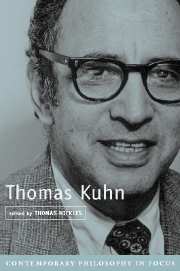Book contents
- Frontmatter
- Contents
- Contributors
- Preface
- Introduction
- 1 Kuhn and Logical Empiricism
- 2 Thomas Kuhn and French Philosophy of Science
- 3 Normal Science and Dogmatism, Paradigms and Progress: Kuhn ‘versus’ Popper and Lakatos
- 4 Kuhn's Philosophy of Scientific Practice
- 5 Thomas Kuhn and the Problem of Social Order in Science
- 6 Normal Science: From Logic to Case-Based and Model-Based Reasoning
- 7 Kuhn, Conceptual Change, and Cognitive Science
- 8 Kuhn on Concepts and Categorization
- 9 Kuhn's World Changes
- 10 Does The Structure of Scientific Revolutions Permit a Feminist Revolution in Science?
- Selected References in English
- Index
- References
7 - Kuhn, Conceptual Change, and Cognitive Science
Published online by Cambridge University Press: 07 December 2009
- Frontmatter
- Contents
- Contributors
- Preface
- Introduction
- 1 Kuhn and Logical Empiricism
- 2 Thomas Kuhn and French Philosophy of Science
- 3 Normal Science and Dogmatism, Paradigms and Progress: Kuhn ‘versus’ Popper and Lakatos
- 4 Kuhn's Philosophy of Scientific Practice
- 5 Thomas Kuhn and the Problem of Social Order in Science
- 6 Normal Science: From Logic to Case-Based and Model-Based Reasoning
- 7 Kuhn, Conceptual Change, and Cognitive Science
- 8 Kuhn on Concepts and Categorization
- 9 Kuhn's World Changes
- 10 Does The Structure of Scientific Revolutions Permit a Feminist Revolution in Science?
- Selected References in English
- Index
- References
Summary
INTRODUCTION
The research project outlined in Thomas Kuhn's The Structure of Scientific Revolutions seems intrinsically historical, philosophical, and psychological (Kuhn 1970). However, by and large, Kuhn never utilized research in the cognitive sciences that would have furthered his own paradigm in ways I think he would have found agreeable. Until his very last writings, psychology dropped out of Kuhn's post-Structure published articulations of his views just at the time that the cognitive revolution was beginning to provide accounts of representation, problem solving, and learning that I believe are pertinent to his intuitive insights. With hindsight one can construct significant parallels between the views of knowledge, perception, and learning developed in each. In what follows I will discuss in what ways some of Kuhn's insights might be furthered today in light of cognitive science research. Seen through a cognitive lens, Kuhn's little book seems all the more remarkable and insightful. Many of the issues with which he grappled have been the subject of entire areas of research in cognitive science, especially cognitive psychology. In the course of this essay I can only give brief indications of how Kuhn's thinking and research in areas of cognitive science have been running along parallel lines and of how one might, through cognitive-historical analysis, create some intersecting lines.
In his Presidential Address to the Philosophy of Science Association, Kuhn expressed his abiding interest as being in “incommensurability and the nature of the conceptual divide between the developmental stages separated by … ‘scientific revolutions’” (Conant and Haugeland 2000, p. 228).
- Type
- Chapter
- Information
- Thomas Kuhn , pp. 178 - 211Publisher: Cambridge University PressPrint publication year: 2002
References
- 16
- Cited by

